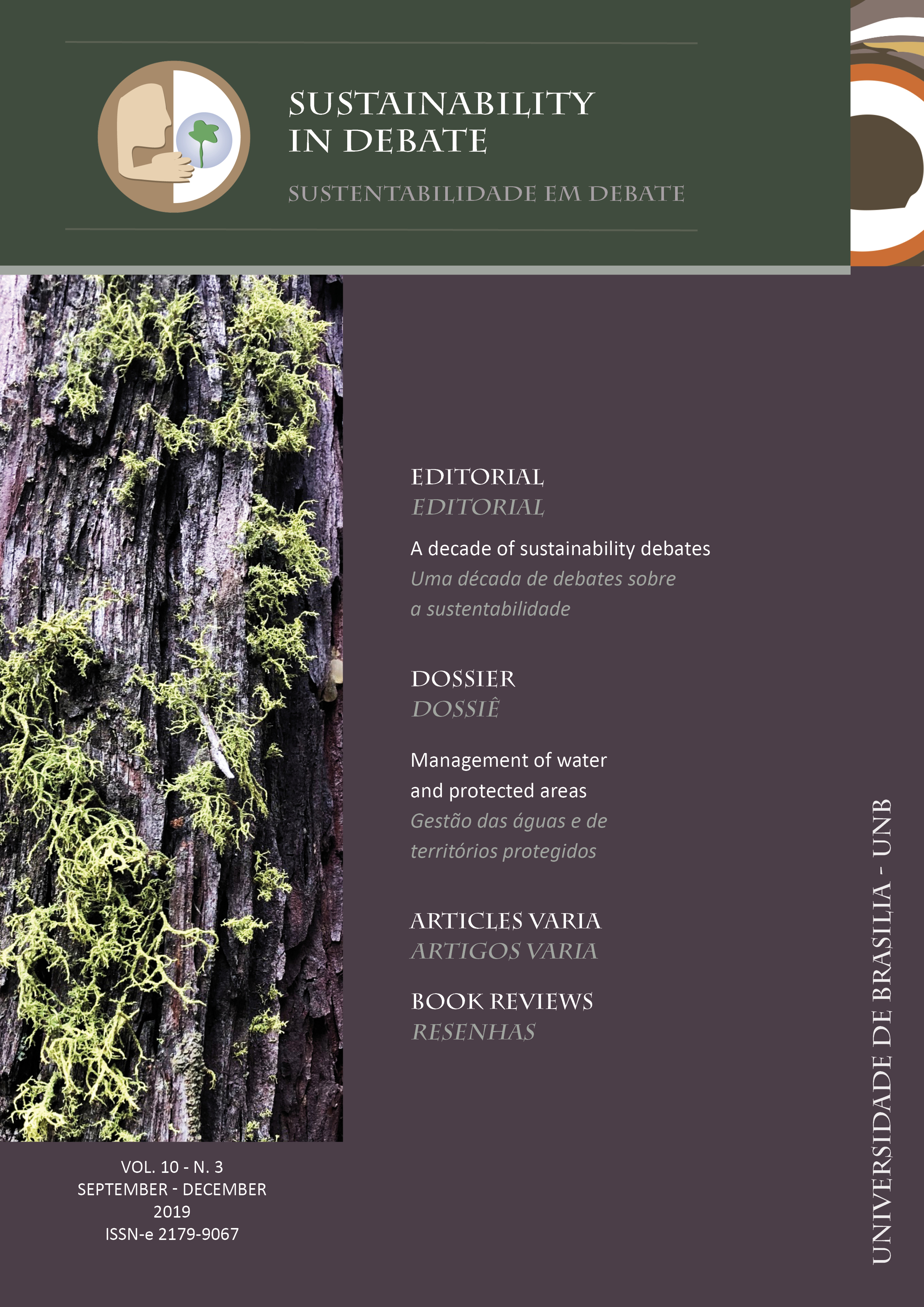International climate change negotiation: the role of Brazil
DOI:
https://doi.org/10.18472/SustDeb.v10n3.2019.2796Palabras clave:
Intergovernmental Panel on Climate Change. United Nations Framework Convention on Climate Change. Conference of the Parties. Sustainable Development. Low Carbon Agriculture.Resumen
The increase of greenhouse gases in the atmosphere raises the average temperature of the planet, triggering problems that threaten the survival of humans. Protecting the global climate from the effects of climate change is an essential condition for sustaining life. For this reason, governments, scientists, and society are joining forces to propose better solutions that could well-rounded environmentally, social and economic development relationships. International climate change negotiations involve many countries in establishing strategies to mitigate the problem. Therefore, understanding international negotiation processes and how ratified agreements impact a country is of fundamental importance. The purpose of this paper is to systematize information about how climate negotiations have progressed, detailing key moments and results, analyzing the role that Brazil played in the course of these negotiations and the country’s future perspectives.
Descargas
Citas
BRAZIL. Brazil’s Nationally Appropriate Mitigation Actions, 2010. Available from: <https://unfccc.int/files/focus/mitigation/application/pdf/brazil_namas_and_mrv.pdf>. Accessed: 25 oct. 2019
BRAZIL. Brazil Intended Nationaly Determined Contribution (INDCs), 2015. Available from: <https://www4.unfccc.int/sites/submissions/INDC/Published%20Documents/Brazil/1/BRAZIL%20iNDC%20english%20FINAL.pdf>. Acesso em: 25 oct. 2019.
Embrapa, 2018. Visão 2030: o futuro da agricultura brasileira. ”“ Brasília, DF: Embrapa, 2018. 212 p.
FRONDIZI, I. M. DE R. L. O Mecanismo de Desenvolvimento Limpo: guia de orientação-2009. Rio de Janeiro: Imperial Novo Milênio, 2009.
IBGE, 2013. Projection of the Population of Brazil by sex and age: 2000-2060. August 2013. Available at http://www.ibge.gov.br/home/estatistica/populacao/projecao_da_populacao/2013/default.shtm, accessed on 09/09/2019.
IPCC, C. C. Climate change: the IPCC scientific assessment. New York: Cambridge University Press, 1990. Available from: <https://www.nrel.colostate.edu/assets/nrel_files/labs/ryan-lab/pubs/Melillo_et_al_1990_IPCC1_WG1.PDF>. Accessed: 25 oct. 2019.
MAAMOUN, N. The Kyoto protocol: Empirical evidence of a hidden success. Journal of Environmental Economics and Management, v. 95, p. 227”“256, 2019.
MENDES, T. DE A. Desenvolvimento sustentável, política e gestão da mudança global do clima: sinergias e contradições brasileiras. Brasília: Universidade de Brasília, 2014.
MILKOREIT, M. The Paris Agreement on Climate Change””Made in USA? Perspectives on Politics, p. 1”“19, 2019.
MIRANDA, E. E. Meio ambiente: a salvação pela lavoura. Ciência e Cultura, v. 69, n. 4, p. 38-44, 2017.
RODRIGUES, D. F.; GALVÃO, V. K. Atores e instituições na formulação da Política de Mudanças Climáticas no Brasil. Sustentabilidade em Debate, v. 9, n. 1, p. 145”“157, 2018.
RODRIGUES, R. de A. R., CONCEIÇÃO, M. C. G., BIDONE, E. D., MATOS, E. S., CORDEIRO, R. C., & SELVA, G. V. (2019). The actions of the Brazilian agricultural sector in the context of climate change negotiations. Sustentabilidade Em Debate, 10. (2), 28 - 37.
SFORNA, G. Climate change and developing countries: from background actors to protagonists of climate negotiations. International Environmental Agreements: Politics, Law and Economics, v. 19, n. 3, p. 273”“295, 2019.
SHARMA, P.; PAYAL, P. Climate Change and Sustainable Development: Special Context to Paris Agreement. 2019.
UNFCCC. United Nations Framework Convention on Climate Change, 1992. Available from: <https://unfccc.int/sites/default/files/conveng.pdf>. Accessed: 25 oct. 2019
UNFCCC. United Nations Framework Convention on Climate Change. Implementation of the Berlin Mandate, 1997. Available from: <http://unfccc.int/cop3/resource/docs/1997/agbm/misc01a3.htm>. Accessed: 25 oct. 2019
UNFCCC. Kyoto Protocol to the United Nations Framework Convention on Climate Change, 1998. Available from: <https://unfccc.int/resource/docs/convkp/kpeng.pdf>. Acesso em: 25 out. 2019
UNFCCC. Report of the Conference of the Parties on its thirteenth session, held in Bali, 2008. Available from: <https://unfccc.int/resource/docs/2007/cop13/eng/06a01.pdf>. Accessed: 25 oct. 2019
UNFCCC. United Nations Framework Convention on Climate Change. Paris Agreement, 2015.
Available from:
<https://unfccc.int/sites/default/files/english_paris_agreement.pdf>. Accessed: 25 oct. 2019
UNFCCC. United Nations Framework Convention on Climate Change. Talanoa Dialogue Platform, 2018. Available from:
<https://unfccc.int/process-and-meetings/the-paris-agreement/the-paris-agreement/2018-talanoa-dialogue-platform>. Accessed: 25 oct. 2019
UNFCCC. Report of the Conference of the Parties on its twenty-fourth session, held in Katowice from 2 to 15 December 2018. 2019. Available from: <https://unfccc.int/sites/default/files/resource/10a1.pdf>. Accessed: 25 oct. 2019
USDA. USDA agricultural projections to 2026. Washington, DC, 2017. (Long-term projections report OCE2017-1). Available from:
<https://www.usda.gov/oce/commodity/projections/USDA_Agricultural_Projections_to_2026.pdf>. Accessed: 06 oct. 2019.
Descargas
Publicado
Cómo citar
Número
Sección
Licencia
La presentación de la(s) obra(s) científica(s) original(es) por parte de los autores, como titulares de los derechos de autor de los textos enviados a la revista, de conformidad con la Ley 9.610/98, implica la cesión de derechos de autor de publicaciones impresas y/o digitales a la Revista de Sustenibilidad en Debate de los artículos aprobados para fines de publicación, en un único número de la Revista, autorizando también que la(s) obra(s) científica(s) aprobada(s) se divulguen de forma gratuita, sin ningún tipo de reembolso de derechos de autor, a través del sitio web de a Revista, para leer, imprimir y/o descargar el archivo de texto, a partir de la fecha de aceptación para publicación. Por lo tanto, los autores, al presentar los artículos a la Revista y, en consecuencia, la libre cesión de derechos de autor relacionados con el trabajo científico presentado, son plenamente conscientes de que no serán remunerados por la publicación de los artículos en la revista.Â
La Revista está licenciada bajo una licencia no comercial y sin derivaciones Creative Commons (No permite la realización de obras derivadas) 3.0 Brasil, con el propósito de difundir conocimientos científicos, como se indica en el sitio web de la publicación, que permite el intercambio del texto y el reconocimiento de su autoría y publicación original en esta revista.
Los autores pueden asumir contratos adicionales por separado, para la distribución no exclusiva de las obras publicadas en la revista Sustenibilidad en Debate (por ejemplo, en un capítulo de libro), siempre que se indique que los textos se publicaron originalmente en esta revista y que se menciona el DOI correspondiente. Se permite y incentiva a los autores a publicar y distribuir su texto online después de su publicación (por ejemplo, en repositorios institucionales o en sus páginas personales).Â
Los autores aceptan expresamente los términos de esta Declaración de Derechos de Autor, que se aplicará a la presentación si es publicada por esta Revista.









